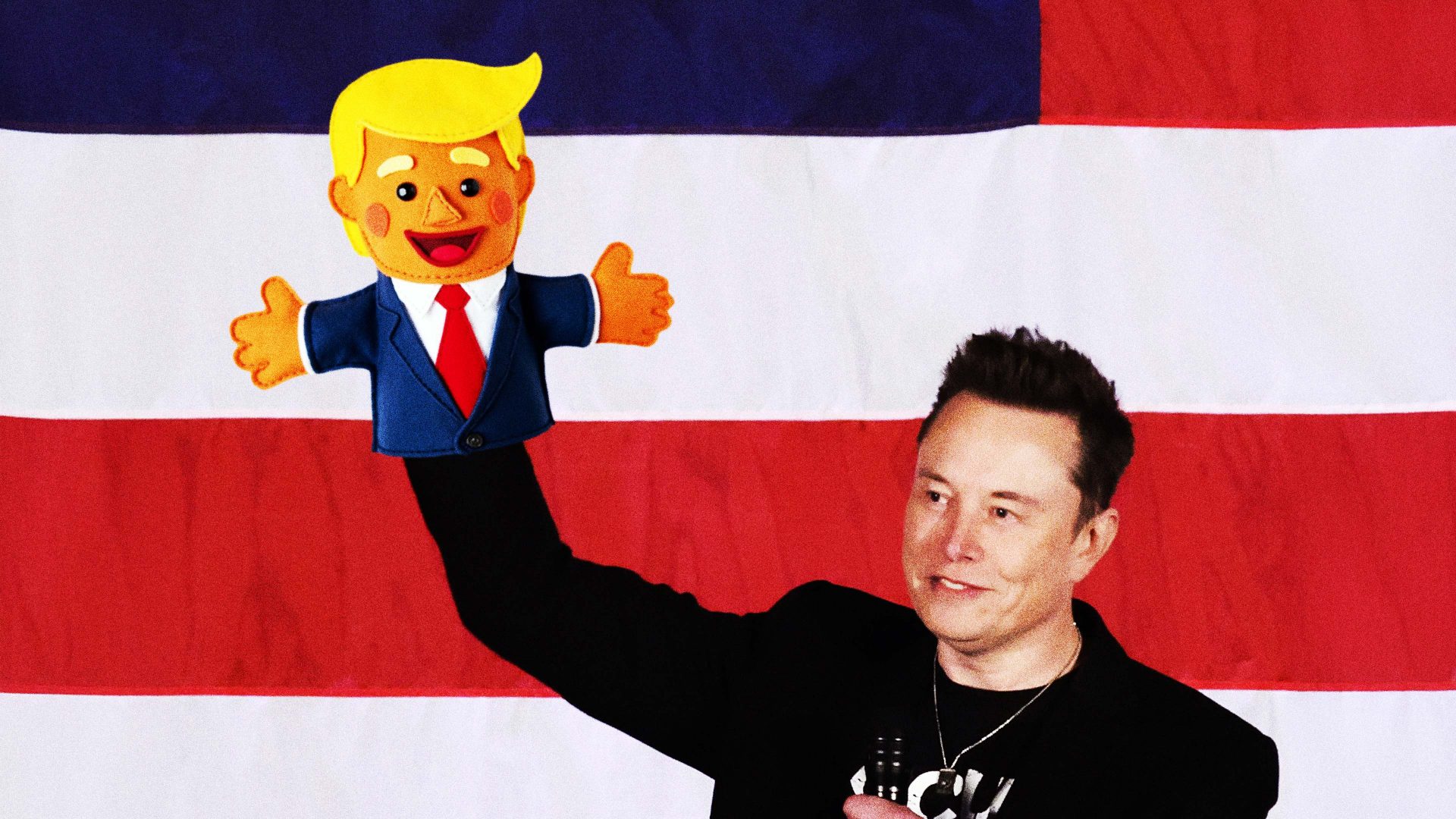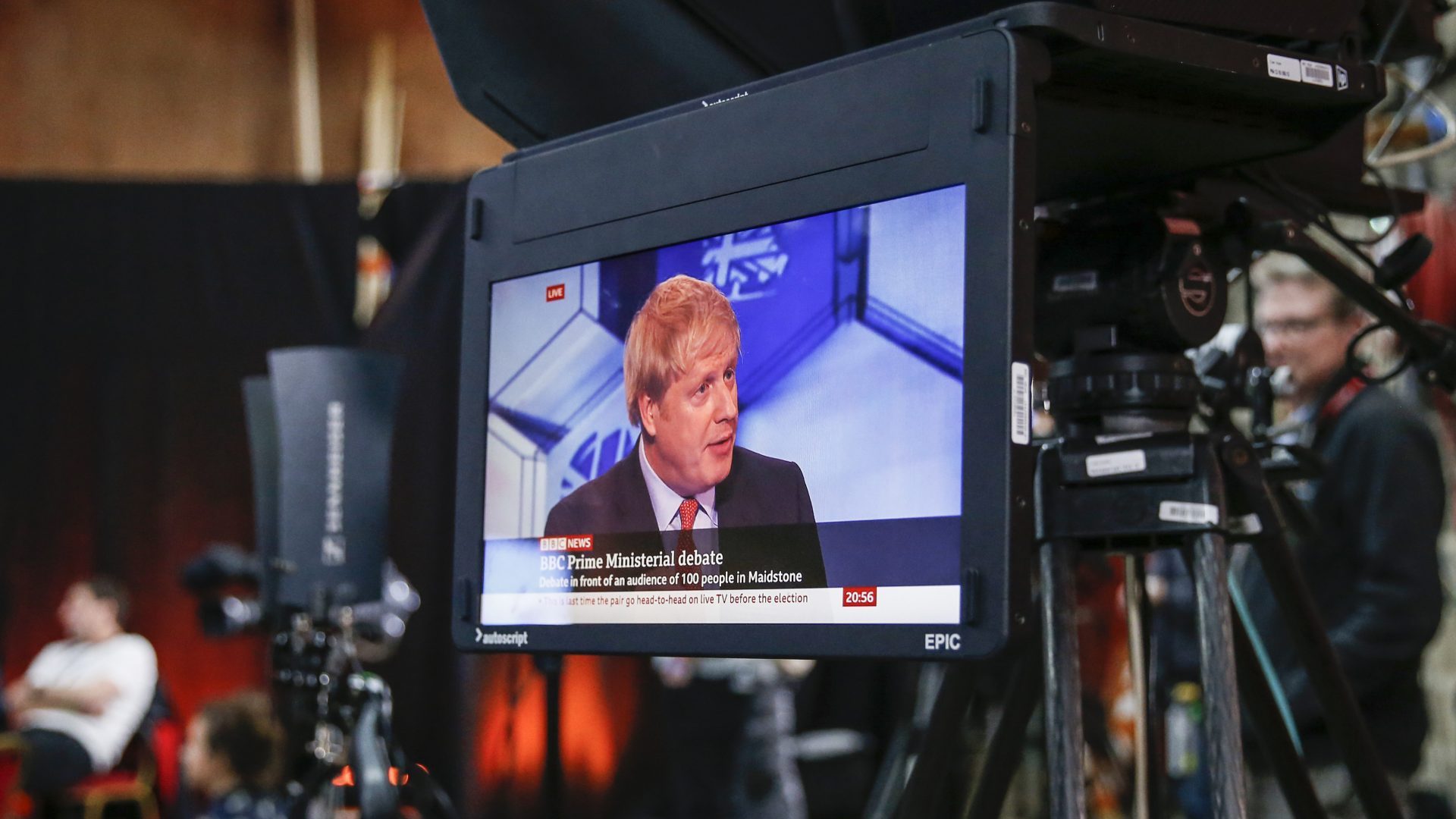You can tell that it is starting to needle him. In a speech at a Turning Point USA rally on December 22, Donald Trump felt obliged to remind the world that he, rather than Elon Musk, would soon be in the Oval Office.
“No, he’s not going to be president, that I can tell you,” he said. “And I’m safe. You know why? He can’t be. He wasn’t born in this country. Ha ha ha!”
Aside from this embarrassing clarification, the president-elect was as effusive as ever about the world’s richest man and self-styled “first buddy”: “Elon’s done an amazing job… we want to thank him”. But all the mockery and memes are clearly getting under his orange skin: Trump as Musk’s First Lady, as a toddler sitting in front of his desk, as his court jester, his dog, his server in McDonald’s, his gimp.
For a pathological narcissist, who recently pulled off the biggest political comeback of modern times, winning both the electoral college and the popular vote, and beating the rap in a string of court cases, such derision must be intolerable.
Bad enough, at any rate, for him to despatch his press secretary, Karoline Leavitt, to tell Fox News that “President Trump is the leader of the Republican Party. Full stop”. As Ronald Reagan used to say: “If you’re explaining, you’re losing”.
What is remarkable is that he continues to indulge Musk’s power grabs and divisiveness. On Saturday, he intervened in an escalating row between Musk and hardcore MAGA nativists over skilled immigrant workers – on the side of the tech tycoon. “I have many H-1B visas on my properties,” he told the New York Post. “I’ve been a believer in H-1B. I have used it many times. It’s a great program.”
It is probable that Trump was mixing up the H-1B scheme, which allows skilled workers to work for three years in the US and is cherished by the tech sector, with the H-2B programme, which is mostly used for domestic staff and gardeners. But the point of his remark was purely political – to settle a vicious argument within his own tribe, triggered by the appointment of Sriram Krishnan, an Indian-born venture capitalist, as his AI adviser.
On one side are Laura Loomer, the far right conspiracy theorist who was at Trump’s side at key moments of the campaign; the ultra-conservative commentator, Ann Coulter; and Steve Bannon, his former chief strategist, who deplores the influence of tech tycoons upon the president-elect, insisting that “you can’t run a country by algorithm”.
On his War Room podcast last Friday, Bannon denounced the H-1B scheme as an absolute betrayal of America First ideology: “This thing’s a scam by the oligarchs in Silicon Valley to basically take jobs from American citizens, give them to what become indentured servants from foreign countries, and then pay them less”.
On the other side are the tech and venture capital titans who have recently swarmed around Mar-a-Lago, Trump’s “Dark Camelot” in Palm Beach, Florida. In a post on X on Saturday, Musk told his opponents to “[t]ake a big step back and FUCK YOURSELF in the face. I will go to war on this issue the likes of which you cannot possibly comprehend”.
More lucidly, but no less provocatively, his co-chair of the Department of Government Efficiency, Vivek Ramaswamy, attacked “[o]ur American culture [that] has venerated mediocrity over excellence for way too long… A culture that celebrates the prom queen over the math olympiad champ, or the jock over the valedictorian, will not produce the best engineers”. Well, that’s most of Middle America told, then.
For more than 18 months, Trump campaigned ferociously on immigration and border policy, promising mass deportation of undocumented migrants and much stricter controls on legal incomers. And yet here he is, not yet in office, siding with the more liberal position on work visas taken by his new tech allies – led by Musk.
No less remarkably, the president-elect has allowed his sharp-elbowed adviser, a private citizen who has never held elected office, to bully Congress over an all-important funding bill that, if not passed, would have shut down the federal government over Christmas.
Last Wednesday, Musk posted more than 150 times to his 209.6 million followers on X about the original bill, declaring that any lawmaker who supported it “deserves to be voted out in 2 years” – no empty threat from a man who just spent $277m supporting Trump and other GOP candidates.
In the process, he has utterly humiliated Mike Johnson, the Speaker of the House, who was reduced to claiming on Fox & Friends that “I was communicating with Elon last night… Elon, Vivek and I are on a text chain together”.
To rub salt into the wound, a group of Republican lawmakers, led by the Georgia congresswoman Marjorie Taylor Greene, have suggested that Johnson be replaced by Musk – since, technically, the Speaker is not required to be an elected representative. “Nothing would disrupt the swamp more,” posted Senator Rand Paul of Kentucky.
In any case: Musk does not need to be Speaker to become the most powerful businessman in the history of the Republic. Of the Founding Fathers, John Adams was most fearful of such oligarchs, whom he called “the few”.
In 1896, the mighty cartel of JP Morgan, Andrew Carnegie and John D Rockefeller engineered the election of president William McKinley. After his assassination, McKinley was replaced by Theodore Roosevelt, who, in contrast, was opposed to “the men of swollen fortune” and determined that America must not be “the civilization of a mere plutocracy, a banking-house, Wall-Street-syndicate civilization”.
Substitute “Silicon Valley” for “Wall Street” and witness Roosevelt’s nightmare come true in Musk’s hyper-capitalist ascendancy. He is not only one of the federal government’s biggest contractors. He will now have sweeping power over its budget (which he and Ramaswamy plan to cut by “at least $2tn”) and huge influence over the regulations and procurement rules that shape his own businesses’ fortunes. Since the election, his personal wealth has soared by 70% to $450bn.
What is the spell that Musk has cast over Trump? The president-elect has long been mesmerised by the sheer shininess, futurism and plutocracy that the tech colossus personifies. Five years ago, he spoke protectively of him in an interview with CNBC: “I was worried about him, because he’s one of our great geniuses, and we have to protect our genius – you know we have to protect Thomas Edison, and we have to protect all of these people that came up with originally the light bulb, and the wheel, and all of these things”.
This aura of cutting-edge dynamism and innovation has undoubtedly been politically useful to Trump – an optimistic counterbalance to his rhetoric of retribution, scapegoating and dread. Following Musk’s lead, the giants of Silicon Valley have queued up to kiss the presidential ring.
Mark Zuckerberg, the chairman of Meta, Jeff Bezos, the founder of Amazon and Sam Altman, the CEO of OpenAI have each donated $1m to Trump’s inauguration committee. The tech venture capitalist Marc Andreessen – one of Musk’s closest collaborators – has been assisting the transition team at Mar-a-Lago, claiming in podcast interviews that “it’s morning in America”.
Musk, for his part, was not initially sold on Trump, telling CNBC in November 2016 that “he doesn’t seem to have the sort of character that reflects well on the United States”. As his biographer Walter Isaacson writes, he took a “hopscotch path to the right”, encouraged to give the new president a chance by his friend and fellow tech tycoon Peter Thiel.
When Trump withdrew the US from the Paris climate change agreement, Musk resigned in protest from two presidential advisory councils. At the time, he still regarded the 45th president as a joke: “Trump might be one of the world’s best bullshitters ever… If you just think of Trump as sort of a con-man performance, then his behaviour sort of makes sense”.
A pincer movement in his life – partly personal, partly professional – drove him to embrace the right ideologically, and, eventually, Trump as a candidate. His fixation with destroying what he calls the “woke mind virus” reflected the breakdown of his relationship with his daughter Vivian Jenna Wilson, as she proceeded with her transition and cut off all ties with him.
Meanwhile, Musk was outraged by the restrictive measures taken all over the world during the pandemic, tweeting after his new plant in Shanghai was shut down in March 2020: “The coronavirus panic is dumb”. He was soon describing lockdowns as “fascist”, and, in May of that year, urged his followers to “take the red pill” – a metaphor borrowed by the right from the movie The Matrix to suggest awakening from left-liberal delusion to confront reality.
As late as November 2022, he told Isaacson: “I’m not Trump’s fan. He’s disruptive. He’s the world’s champion of bullshit.” But when it became clear that the former president was going to win the Republican nomination, he ditched Ron DeSantis as his favoured candidate and went all in with the Big Orange. After Trump narrowly escaped assassination at Butler, Pennsylvania, on July 13, Musk posted: “I fully endorse [him] and hope for his rapid recovery.”
The metamorphosis was complete: from a businessman happy to wait six hours in a queue to shake Barack Obama’s hand to a ketamine-fuelled toddler prancing in a Dark MAGA baseball hat at Trump’s rallies.
And Trump loved it. He welcomed Musk fully into his political inner sanctum and family life, giving him the run of Mar-a-Lago.
In his acceptance speech early on November 6, he raved about his new sidekick: “Let me tell you, we have a new star. A star is born. Elon. Now he is, he’s an amazing guy”.
The president-elect then proceeded – and not for the last time – to go into toe-curling detail about one of Musk’s SpaceX rockets (“I saw it come down, and turn around, and it was, you know, it’s like 22 storeys tall, by the way, it looks a little smaller than that, but it’s big, and it came down and down, and you saw that fire burning and I said: ‘Only Elon can do this, it must be an Elon’” etc etc).
Doubtless the real estate developer sees in Musk an interstellar version of himself, building rockets that are the next evolutionary step up from Trump Tower. And though he probably thinks Nietzsche is something you get on a bagel in Queen’s, he also has a clear affinity with a man who shares his ruthless will to power.
The only question is how long it will take for the 47th president to weary of Musk. Such co-dependencies are, by their very nature, doomed, and soon curdle into resentment and rivalry. Trump, easily bored at the best of times, will not long tolerate being upstaged.
There are a host of issues that might be the pretext for the sundering – not least US policy on China, where Musk is a hero and has huge commercial interests (according to Bannon, “he’s owned by the Chinese Communist Party”). But their eventual falling out will be personal, not business, as the unstoppable ego finally collides with the immovable megalomaniac.
The twist in the tale is that unlike the many previous advisers and office holders that Trump has cast aside like toys, Musk will simply move on to his next deranged obsession. Already, he is trying to disfigure UK politics by giving Nigel Farage and Reform UK more money than any other party can match.
In Germany, he is backing the far Right AfD. And then there is the 2028 US presidential election to think about.
Trump can do plenty of damage in four years, but – unless he defies the constitution and seeks a third term – he will leave the Oval Office for the last time in January 2029, aged 82. Musk, on the other hand, is just getting started. Which country will he buy next?




